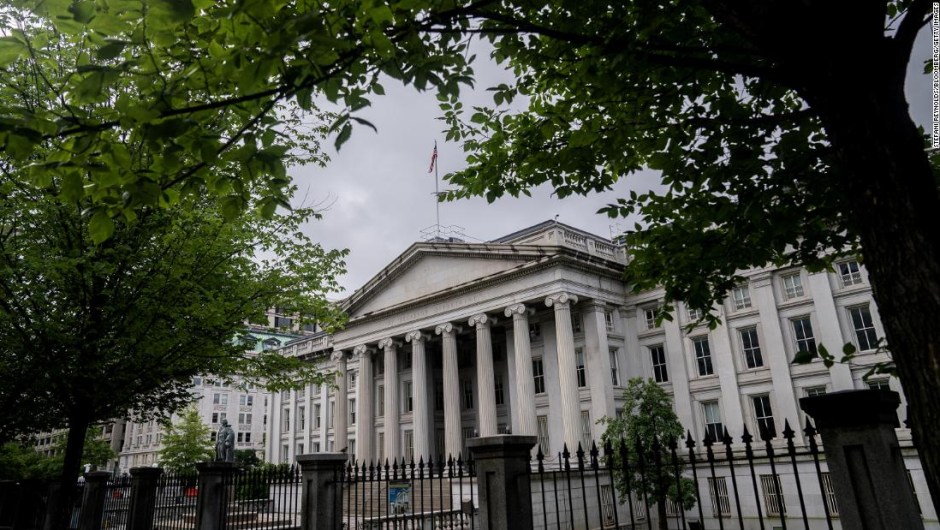The US Treasury Department building in Washington, DC, US, on Saturday, June 26, 2021. The Federal Reserve might consider an interest-rate hike from near zero as soon as late 2022 as the labor market reaches full employment and inflation is at the central bank's goal.
Photographer: Stefani Reynolds / Bloomberg
(CNN Business) -
Defaulting on US debt would be a "catastrophic blow" to the US economic recovery from COVID-19, triggering a recession that could well rival the Great Recession, warns Moody's Analytics in a new report.
If the United States defaults on its debt payments and the situation continues, the recession that it would bring would end almost 6 million jobs and raise the country's unemployment rate to almost 9%, Moody's projects in a report published on Tuesday. .
The market crisis would lower share prices by a third, wiping out about $ 15 trillion in household wealth, according to the report.
"This economic scenario is cataclysmic," wrote Mark Zandi, chief economist at Moody's Analytics.
Stagflation hit the economy in the past.
Are you back?
The US Treasury Department estimates that it will run out of cash sometime in October, unless Congress raises the debt ceiling.
Despite the looming possibility of default, Republicans have refused to back an increase in the debt ceiling due, in part, to concerns about the Biden administration's vast spending plans.
Moody's notes that financial markets are yet to show signs of fear over the issue of raising the debt ceiling, suggesting there is a widespread belief that Congress will eventually take action.
The impact on Wall Street has been much less so far than during the defining moments of 2011 and 2013.
advertising
"Ironically, because investors seem so optimistic about how this drama will unfold, policy makers may believe they have nothing to worry about and will not resolve the debt cap on time," Zandi wrote.
"This would be an egregious mistake."
TARP moment?
Even a close situation could cost the economy and taxpayers.
Fears of a U.S. default in 2013 raised Treasury yields, costing taxpayers an estimated half a trillion dollars in additional interest costs, as well as making loans more expensive for families and businesses, according to Moody's.
If Congress does not lift the debt ceiling and the Treasury begins to pay bills late and defaults, the markets would react very negatively.
"There is likely to be a TARP moment," Zandi wrote, referring to the market crash in 2008 after Congress initially failed to pass the Wall Street bailout, then quickly reversed.
[TARP refers to the government program implemented in 2008 to purchase assets from financial institutions to deal with the mortgage crisis].
ANALYSIS |
Time is running out for the US Congress to do something.
This is what you need to know
The worst-case scenario, according to Moody's, would be that Congress continues to fail to act to raise the debt ceiling and the stagnation is prolonged.
That would force the federal government to delay about $ 80 billion in payments due November 1, including those for Social Security recipients, veterans and the active duty military, according to Moody's.
If the crisis lasted until November, new and drastic spending cuts would have to be imposed.
Beyond the immediate hit to the US economy, a default is likely to cast a shadow over the United States for a long time to come.
"Americans would pay for this default for generations," Zandi wrote, "as global investors would rightly believe that the finances of the federal government have become politicized and that there may come a time when they are not being paid what they are. you owe them when you owe them. "
United States debt

